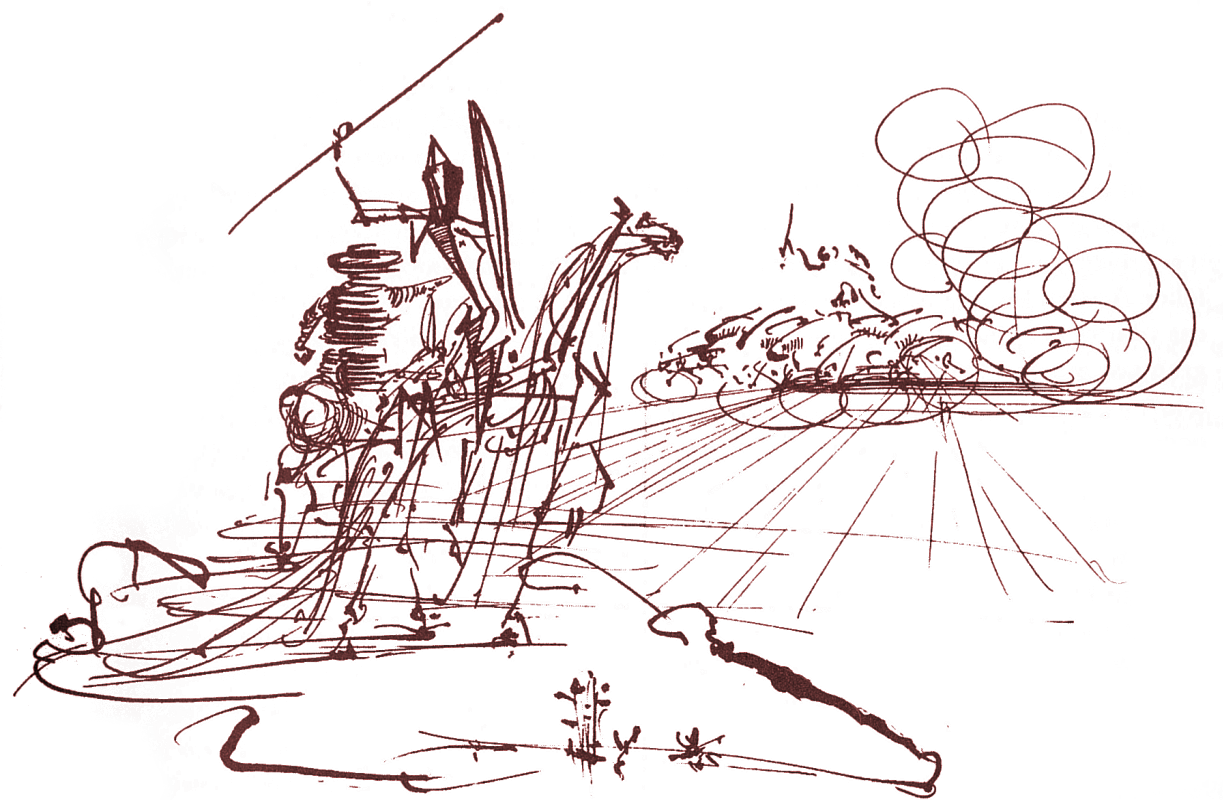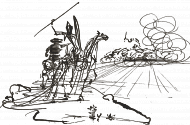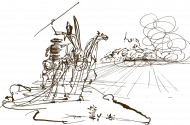“You know what they need to do with them blonde-hair, blue-eye devils? They need to kill ‘em right when they drop out they momma ass.” --My joy of a bunkie
“See this skin?” A mestizo points to his almost white face. “This white skin is a scar from when your people raped my people.” My milk-chocolate colored friend points to his skin, “This skin is from where the master raped a slave. You know some master saw some mocha out in the field and wanted to get him some gorilla love.”
“I’ll tell you one thing, I spent more time bandaging up skinned knees and quality family time when I was selling drugs than when I had to work 50 hours a week for $5.75 an hour.” –American-born Mexican
“The feds wanna write all these new laws but they don’t even wanna follow the laws they done made. And, you know, what’s good for the geese is good for the gander.” --50 year-old black man
“In a world which has truly been turned on its head, truth is a moment of falsehood.” Guy Debord, “Society of the Spectacle”
Hey Everyone,
I have some cynically moral friends here who always remind me of the fact that if these guards were gone, the body bags would start to line the hallways (when the cat is away, the mice will play). And the only thing which prevents the murders and rapes is the fear of getting shipped to a max. That these people are guilty, and they earned their stay here. That to hear them tell it, they’re all innocent.
This is mostly true. Our justice system has managed to round up a mess load of people with plenty of vices which they have fed through selfish enterprise. Sounds like the perfect description of the American consumer: television drugged, hungry, and employed in order to gratify the id. Of course, where does the human’s natural selfishness start and the consumerist indoctrination begin?
A society which suckles and nurtures the greed instinct into the Atlas of the economy has no business incarcerating it’s most zealously literal acolytes. The real criminals are agitpropogandists of capitalism who manufacture the fever of materialism and carefully inject it into the subconscious. So you’ve got a society which encourages a profligate greed that is clearly a vice yet imprisons them (it’s citizens) for the logical consequent of that belief: the self above the law. (Let he who is without sin cast the first stone . . . )
In the same vein, the Federales disrespect the law in order to “enforce” it. How can you create the rule of law by breaking the law? Does the fear of the violence of the counter-crime deter the criminal or does it reinforce their belief in anarchy and lawlessness? Can you create justice with injustice?
Arbitrariness of law enforcement is certainly frightening, but it destroys the illusion of cop/robber good/evil that is so necessary for the upholdance of the cultural mythology which acts as a moral deterrent to the young: the good guys represent “the law” and the bad guys represent the law-breakers. However, when the good guys also break the law, the young learn the legality of establishment injustice: they come to understand that injustice is the purvey of the powerful. Predictably, they seek to become these brokers of power in their own right, so that their own injustices of will can be reified.
Thus, the regime upheld by force creates a culture of force: as people lose faith in the justice of the law enforcement, even the just begin to rely instead upon their own guns, bats, uncles, brothers and cousins, a return to tribalism. This is precisely the state in which you find the poor black community today. A vigilante hero, however, is one step away from a vigilante villain, and disbelief in the establishment is often followed by total moral disillusionment. A morally disillusioned tribal organization is called a gang. These are the results of lawbreaking, “law” enforcement and racism. A regime upheld by force will eventually be choked to death by followers of that same creed.
Fascism is the establishment’s response to tribalism: a belief that military power should be used to crush the problem. Fascism, the invocation of Nationalism and the complementary figure Racism, Fear and it’s complement War, Masculine Power and it’s complement Dominance, and Unity with it’s complementary repression; yes fascism sleeps lightly. Any crisis will see the power hungry playing up the people’s fears in the hopes of inducing a swoon they can catch and claim to have saved them from.
To recognize fascism, look for the charismatic man: the hero, the leader, powerful and masculine. He exudes the rhetoric of strength and war. In war, the standard modes of fair play need not apply. War is a mechanism for the temporary suspension of the ethical. Prisoners are a luxury. When the “war” metaphor is adopted by a campaign, it quickly becomes a crusade. Think” the “war” on drugs, the “war” on communism and the “war” on terrorism.
War is clear-cut with “good” guys (us) and “bad” guys (them). War is a clear-cut activity, but the politics that drive war are usually economically motivated and of dubious morality.
Thus, the “war” on drugs ought to elicit suspicion rather than quell it. Why do we need a temporary suspension of ethics in order to combat drugs? What moral grey areas need retouching? Why are we manufacturing clarity?
I would posit that the reason we need the moral reassurance of war is to obfuscate the fact that “war” on drugs is a war on people and primarily a war on poor black people. In other words, to mask the classist and racist nature of the “war” on drugs. The whites are here (in prison) primarily for the theft of large sums of money: fraud, mail fraud, and money laundering; whereas the blacks are here primarily for drugs. The whites usually spend 1-3 years here, whereas the blacks are usually here for 6-10 years (make no mistake, the white drug dealers receive equivalent sentences). We must remember, however, that blacks represent 13 percent of national drug users but constitute 35 percent of drug arrests and 53 percent of drug convictions (New York Times).
Drug dealing is a crime of poverty, whereas white-collar crimes are whimsical games of the middle and upper classes. Drugs are a vice commodity, and coke dealers are simply willing brokers of that vice, like alcohol or tobacco, which are substances that our society endorses. When the law simply means “the guys with the guns”, it is a simple moral transduction within this society to legitimate the decision to requite the aching demand.
White-collar crime usually involves the theft of large sums of money: outright or through fraud. Which is the greater moral ill: the sale of a vice to a willing client (the “playground” drug dealer is by and large a myth) or the theft of a large sum of money? (Theft, of course, and fraud, involve doing violence to the will of another). The answer? I’m not really sure either. But our justice system sure is.
I do know, however, that crimes of poverty are crimes that are closer to necessity than crimes of wealth. This is no excuse, of course. A slave imagines that to move up in the world is to become a master himself. The oppressed imagines that liberation from oppression means becoming the oppressor (Paulo Friere).
A “war” on drugs is a war on people, a people who are products of a society which shapes and molds them. Instead of ramping up the punishment, a costly proposition with dubious success, why not try to heal the problem (a bear with an infected bullet wound turns rogue: remove the bullet and stop the bear’s blind rage). Why not spend even half the money we have spent on prisons on education and the resolution of poverty? Just one of those wacky ideas that doe-eyed impractical “liberals” want. They just want more government, don’t they?
Increased imprisonment is just another indication and manifestation of fascism. The BOP doesn’t even pretend to rehabilitate. And that means recidivism. We need something new because this system is not working.
This week I read a science fiction novel by Vernor Vinge called “A Fire Upon the Deep”. It was very creative in regards to artificial intelligence and his ideas about diffuse consciousness. I read two of my favorite books ever for the fourth time or so: Douglas Adams’ “Hitchhikers Guide to the Galaxy” and “The Restaurant at the End of the Universe”. Brilliant and screamingly absurd.
I finally finished “One Dimensional Man: a Study in the Ideology of Advanced Industrial Culture”. It seems to be a fairly seminal postmodern text. I really tend to hate translated academic French writing. But other than that, it was pretty damn good. Circa 1958. It provides an intellectual bedrock for a lot of thoughts on the effects of technology on modern thinking which have come to obtrude at one nowadays, but it was good to hear it all systematized.
Also read Hemingway’s “Farewell to Arms”. His characterization of woman as loving through the pleasure of a man, as a servant, is rather more than chauvinist. But needy people are needy people I suppose. I just didn’t become too attached to the characters. But it did manage to sadden me at the end.
We are quite nearly halfway through our sentence. Whew. So I’ll be out and among you sooner than I left you. Three months to go. There is really something fulfilling about a halfway point. You know? It’s like I just have to do what I’ve already done and that’s it. And the first bit was the hardest. I’ve been standing up for myself more and more lately. When you don’t tell people how you are (bragging) they have to wait and find out. I just started singing in the choir today. It was lots of fun. I look forward to continuing that. But basically, it’s just another week at Camp Happy! (kick in letter-ending theme music)
Love,
Jeremy
“The only way for a European or any white person to understand racism is through interacting with people of color in a principled way, through dealing with people of color in the struggle against white skin privilege.” Dhoruba Bin Wahad in “Still Black, Still Strong: Survivors in the War Against Black Revolutionaries” (Did I mention I read that book too? Excellent book. Highly recommended. A compilation of interviews with Mumia Abu-Jamal, Assata Shakur, and Dhoruba Bin Wahad).









